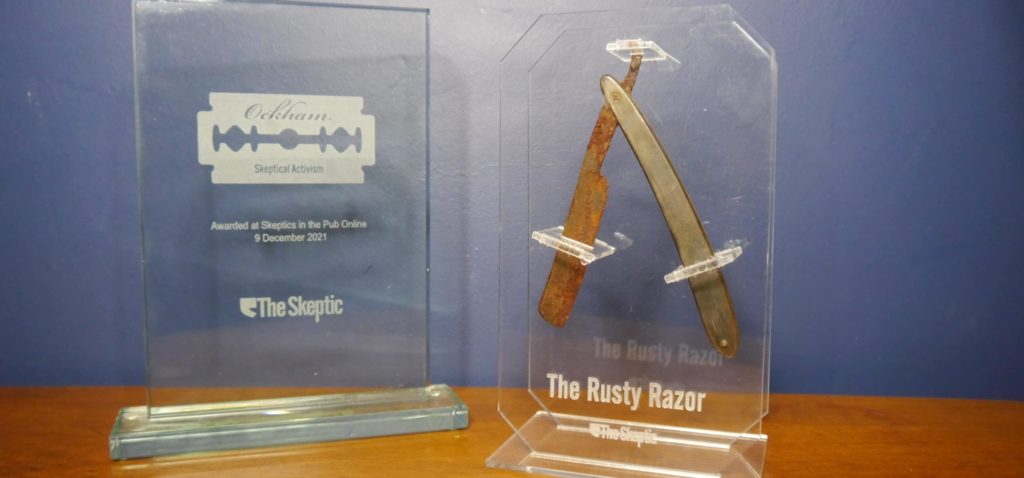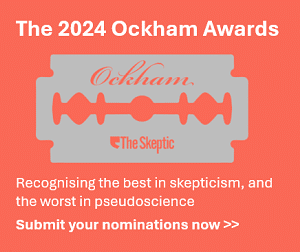Ockham Awards 2024

Following nominations from the public and deliberations from our editorial team, The Skeptic is proud to announce the winners of the 2024 Ockham Awards:
Ockham Award for Skeptical Activism: Dr Flint Dibble
After the airing of the Netflix show Ancient Apocalypse, there was a boom in myths about Atlantis and the existence of a highly advanced but long-extinct ancient civilisation. The star of the show, writer and pseudoarchaeologist Graham Hancock, was often to be found giving interviews to advance his ahistorical theories, especially in arenas unaccustomed to assessing and critiquing outlandish and sensationalist claims – including the most prominent such arena, the Joe Rogan podcast, where his claims were comprehensively debunked in conversation with Dr Flint Dibble.
Michael Marshall said: “Dr Flint Dibble’s four-hour appearance on the Joe Rogan show in April showed that it is possible to offer an authoritative, comprehensive and persuasive retort to even the most sensationalist of claims. What’s more, to do this on Joe Rogan’s show – whose audience has arguably been primed and conditioned to reject reason when more exciting and eye-catching explanations are on offer – was enormously impressive. Dr Dibble went into the belly of the beast, and gave a calm, well-reasoned and enormously patient account of himself and of the evidence, showing that skepticism can be brought to even the most theoretically hostile of audiences, if presented thoughtfully and skillfully.
“With Netflix recently releasing a second series of Ancient Apocalypse, this time inexplicably featuring Keanu Reeves, I’m sure Dr Dibble’s comprehensive knowledge and incredible reserves of patient will once again be invaluable.”
Other past Ockham winners include the Prof Elisabeth Bik, BBC’s disinformation unit, Dr Natália Pasternak, Professor Edzard Ernst, the European Skeptics Podcast, Britt Hermes, and more.
Rusty Razor Award Winner: Elon Musk
After his takeover of the platform in 2022, Musk was responsible for firing half of the company’s moderator team, and a third of its global trust and safety team, enabling the widespread proliferation of misinformation, scams, inauthentic accounts and hate speech. Within the last year, Musk has intervened to restore the Twitter accounts of hundreds of conspiracy theorists, including Sandy Hook ‘truther’ Alex Jones, misogynist and alleged sex trafficker Andrew Tate, and far-right leader and anti-vaccine conspiracist Tommy Robinson – the latter of whom Musk would later cite and retweet on multiple occasions.
The Skeptic Editor Michael Marshall said: “Since Musk’s takeover, Twitter has become a breeding ground for all manner of misinformation and pseudoscience, with Musk personally intervening to remove the checks and balances, under the pretence of a commitment to free speech – apparently as long as that free speech aligns with his personal views. Musk has not only welcomed back some of the most damaging spreaders of harmful untruths, but he has actively engaged with and amplified their voices.
“Where Twitter once ran adverts for brands like Apple, Amazon and Adidas, now the platform’s ads consist of cryptocurrency scams, blue-tick AI bots, and demonstrably fake products. Conspiracy theories around vaccines, climate change, and chemtrails flourish on Musk’s website, while hate speech around race, gender and sexuality has risen significantly. From the invasion of Ukraine, to the war in Gaza, to the UK’s recent race riots, Twitter has become the go-to place for spreading propaganda and politically motivated misinformation, and has happened in no small part due to the deliberate decisions Musk has taken.
“It is therefore hard to deny that Elon Musk is responsible for promoting the most harmful pseudoscience and misinformation of the last year, and that he is a deserving winner of the 2024 Rusty Razor award.”
Rusty Razor Award Runner-Up: Steven Bartlett
Coming in second to Elon Musk for the Rusty Razor this year was Steven Bartlett, star of BBC’s Dragon’s Den and the Diary of a CEO YouTube channel. Bartlett has been a regular source of controversy over the last year, including backing and championing pseudoscientific businesses on the hit BBC One show, platforming health misinformation on his hugely popular podcast, and misleading his viewers with adverts for products he has invested in.
Marshall explained, “In his role on Dragon’s Den, Bartlett has praised and promoted a psychic business that sells healing crystals and spells to break evil curses, a cacao drink which was claimed to use shamanic energy to fight depression, and some stick-on ear decorations whose founder claims can cure ME and fertility issues. All of these products are quite clearly pseudoscientific, and make health claims that are potentially harmful to sufferers of serious conditions, yet they received nothing but praise from Bartlett and some of his fellow Dragons.
“Meanwhile, Bartlett uses his Diary of a CEO YouTube channel to bring to his seven million followers controversial anti-vaccine figures such as Bret Weinstein, Russell Brand, and Jordan Peterson. Health guru Wim Hof claimed in his interview for the show that his breathing techniques could kill bacteria and viruses – a false claim that went unchallenged, that has now been viewed over 1.6 million times. Bartlett, similarly, gave nothing but uncritical acceptance to the claims of Dr Aseem Malhotra – whose misleading claims around the Covid vaccine earned him last year’s Rusty Razor award.
“Bartlett’s podcast episodes have more than half a billion views on YouTube – with an audience that size, he has a duty to scrutinise the claims of the people he chooses to platform. Instead, he uncritically accepts all manner of misleading and false health claims, with apparently little to no care as to what is actually true.”

